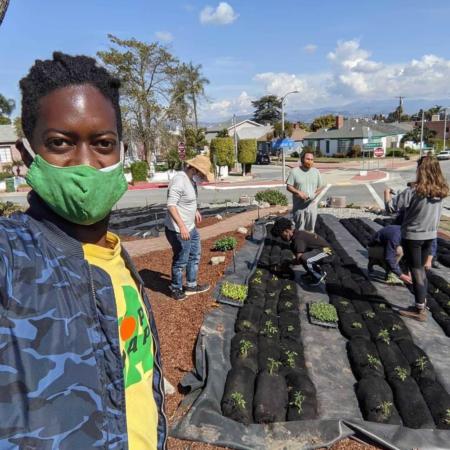This man is transforming front lawns into sustainable farms for families.
Jamiah Hargins is using his expertise to turn South Los Angeles lawns into planted kale, rainbow chard, tomatoes, and enough produce to feed 50 families within the neighborhood each week, Fast Company reports.
“My company partners with homeowners who have a front yard and want to do something positive,” said Hargins, founder of Crop Swap LA.
Crop Swap LA is the startup that installs and manages micro-farms or community gardens.
All neighbors have to do is pay a monthly subscription fee to receive the local goods and they’ll receive both a share of the produce and a cut of the proceeds.
“We maintain it, but they get part of the income every month,” Hargins told Fast Company.
After starting a vegetable garden of his own at home a few years ago and realizing that he’d grown more than his wife could eat, Hargins leaned on Nextdoor to set up produce swaps with neighbors. He then began to think about how to create the infrastructure to grow local food on a larger scale.
The very first neighborhood where the first micro-farm was planted is considered a food desert because residents there don’t have easy access to large supermarkets. Through Crop Swap LA, View Park residents can subscribe to a three-pound mix of fresh, organic greens and vegetables for $36 a month or $43 with delivery.
Hargins works with a group called Enviroscape LA to plan the landscaping which uses a growing method where he says “you pack in as much as you can.”
Other techniques used on the farm to help increase productivity include mesh “socks” on the plant roots which help provide the optimum airflow, drainage, and temperature for the plants to grow faster.
A water recycling system also cycles water through the soil in turn making it nutrient-rich and using a tiny fraction of the water needed to keep a lawn maintained.
“We’re only using 8% of the water that was previously used to grow grass there, but now to grow food,” explained Hargins. “I think about 700 gallons per day were needed to keep that grass healthy. It’s amazing how much it is when you really count it.”
He also notes that the water bills went down drastically for the View Park homeowner of the first micro-farm.
Thanks to a grant from LA2050, a Goldhirsh Foundation program, Crop Swap LA was able to install the first micro-farm and now they have plans to keep going!


